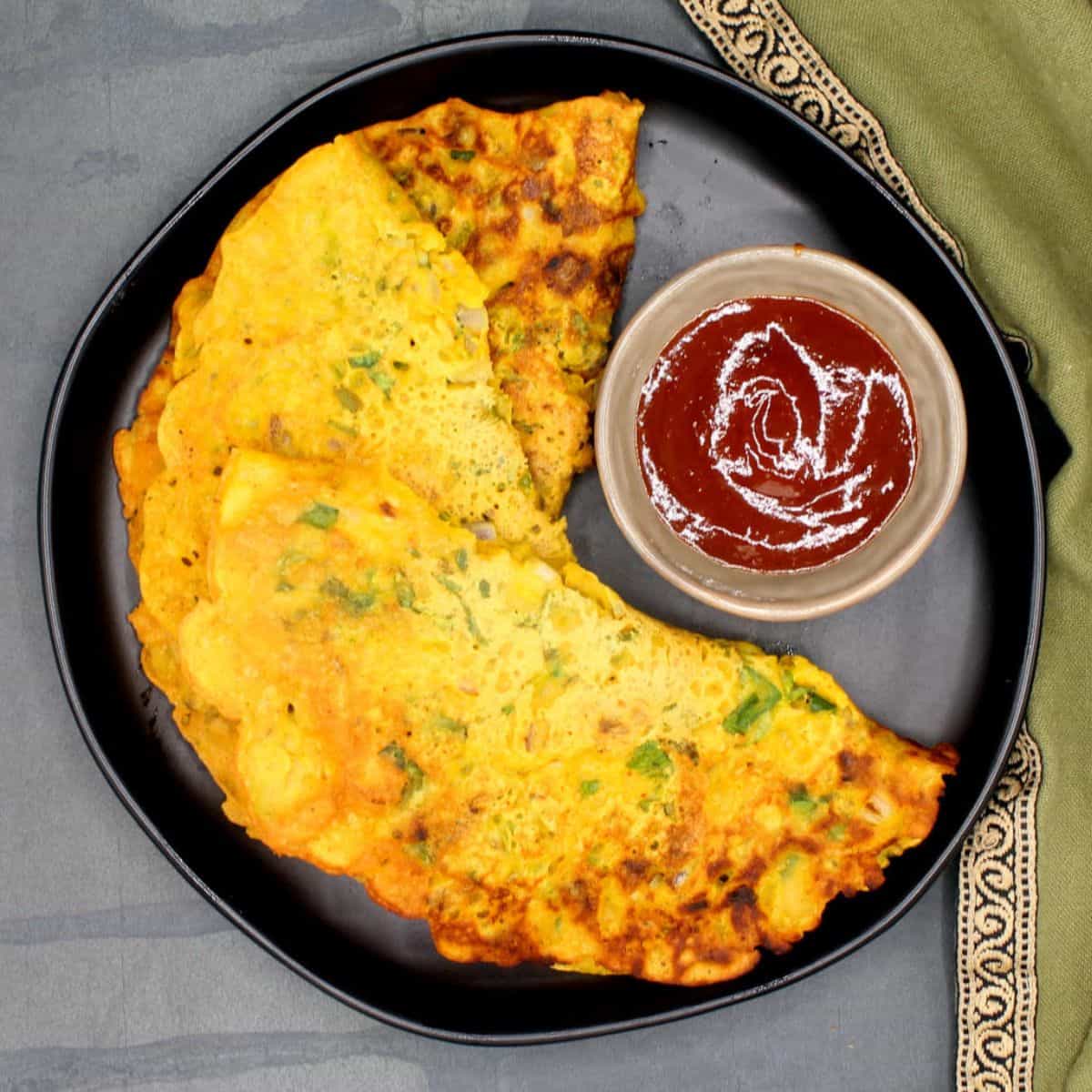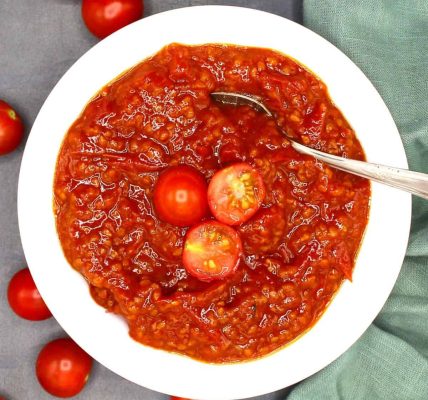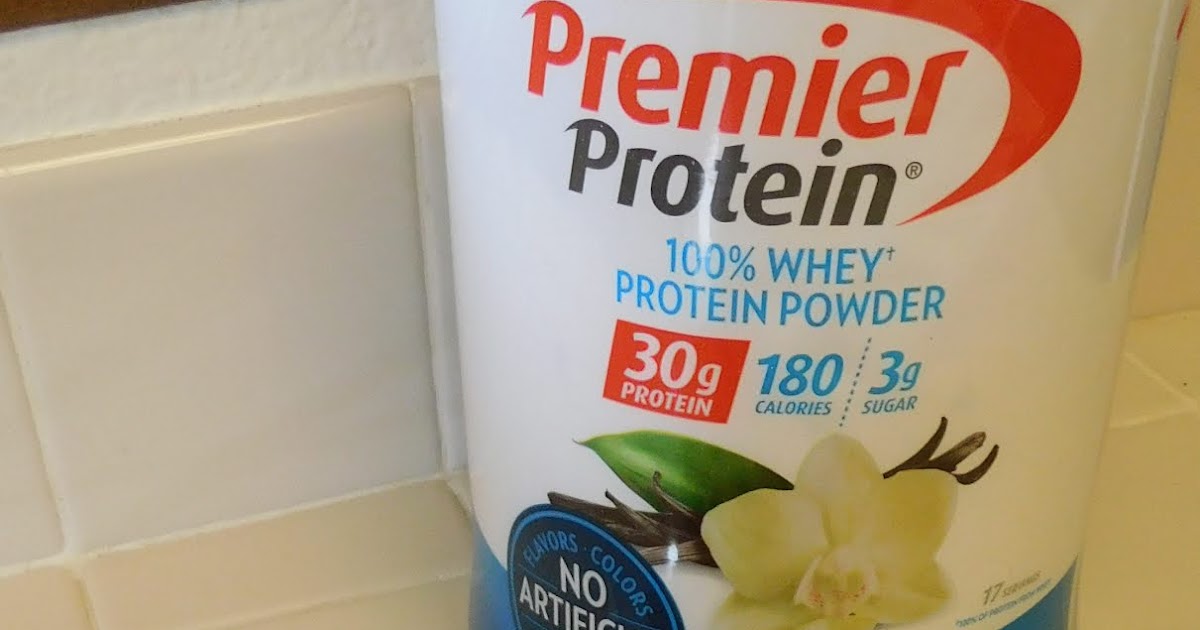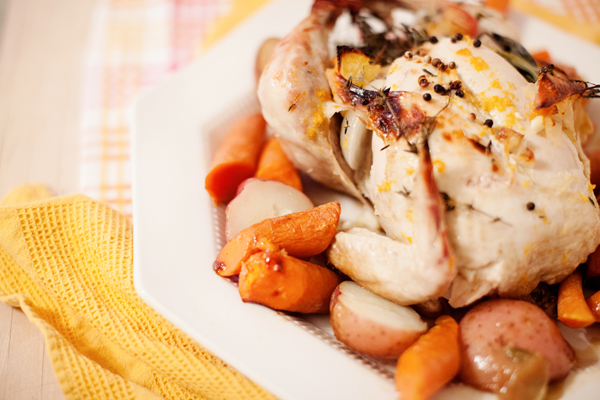Besan Chilla, a savory, eggless, vegetarian omelet from North India, is loaded with healthy protein from chickpea flour and tons of nutrition from veggies. It makes the perfect breakfast, brunch or lunch.

Table of Contents
What is besan chilla?
Besan chilla (also called besan cheela or puda or pudla) is a delicious and eggless north Indian pancake made with chickpea flour or besan. A chilla is extremely nutritious — it is low in fat, loaded with protein from the chickpea flour, and it usually contains other healthy ingredients, including onions, green chili peppers and spices like turmeric and cayenne.
Often, quick-cooking veggies are added to the chilla, making it even healthier. You can make chilla with other beans, like this yummy and extremely healthful sprouted moong chilla. A moonglet is also a kind of chilla.
In India, you would find besan chilla served up as street food or in restaurants under names like “vegetarian omelette” or “vegetable omelette”. It’s easy to see why. A chilla resembles its eggy counterpart so closely, you might think they were separated at birth.
But the resemblance is entirely skin-deep because they taste quite different and weigh far apart on the health scale. While the traditional omelet is loaded with cholesterol, besan chilla has none, of course, and it can be made nearly fat-free if you spray the skillet with cooking spray instead of oil.
And dare I say it tastes better?
Why you will love this recipe
- Flavor-packed. A chilla is just so yummy, with the nutty chickpea flour, onions, chili peppers and cilantro creating magic together. The edges get golden-brown and crispy and decidedly delicious! It will become one of your favorite breakfast recipes for sure.
- Easy. This is a very simple recipe to put together, even if you are a fairly inexperienced cook.
- Nutritious. Everything in this besan chilla is really, really good for you.
- Gluten-free, nut-free, soy-free and vegan. It is friendly to all diets.
Ingredients
- Besan (chickpea flour). The best kind of chickpea flour to use for this recipe is the kind you’d buy from an Indian supplier or grocer. Besan is very finely ground and is made by milling brown chickpeas, whereas the flour labeled here in the U.S. as “garbanzo bean flour” is coarser and made from the larger beige chickpeas we are more familiar with hereabouts.
- Rice flour. Rice flour adds a nice crunch to chilla and also refines the flavor. I used to make chilla without rice flour but started using it at the recommendation of my niece, Preethi, and it definitely enhances the texture.
- Spices: Turmeric, cayenne (or any red chilli powder) and ajwain (carom seeds, optional).
- Herbs: Ginger, garlic, cilantro (coriander leaves) and green chili peppers, like jalapeno or serrano peppers.
- Veggies. Onions (red onions are best), spinach and other veggies of your choice (see helpful tips below for ideas).
- Onions. Red onions are best, but yellow onions will do.
- Oil for cooking chilla. You can use cooking spray.

Helpful tips
- You can make a chilla oil-free, but using a little bit of fat to coat the non-stick griddle or skillet helps create crispy edges. For best results use a cast-iron skillet. For even crispier edges, you can drizzle a bit of oil along the edges of the chilla as it cooks, like you would with a dosa.
- Some cooks add a pinch of baking soda to the recipe, to make the chilla lighter and crispier. If you want to add baking soda, add no more than ⅛th of a teaspoon or a generous pinch to the batter right before you cook the chilla. Be sure to mix it in!
- The reason you need to sift in the chickpea flour is to avoid any lumps that could be hard to get rid of once you start adding water to the batter. Don’t skip this step! Also add water slowly to avoid any clumping.
- You can make the chilla as thick or thin as you want by adjusting the quantity of water in the batter, but don’t overdo it. When you add besan mixed in water to a hot medium, the starches in the lentils bind with the water and firm up as they are heated. This ensures that your chilla will be flippable, just like an egg omelet. But adding too much water can create a batter that will not bind so don’t just pour it in. I needed 1 ½ cups of water for this batter, which makes moderately thin chillas. You can add up to ½ cup more, but probably not more than that. The batter should be of pourable consistency and thinner than a regular pancake batter.
- When adding veggies to the chilla, use veggies that cook quickly, like finely chopped greens, bell peppers, green beans, carrots, beets, cabbage and cauliflower. If you use vegetables that express too much liquid, like summer squash, mushrooms and tomatoes, make sure you give enough time for the ingredients to sit around after they are mixed so the veggies express their liquids before you add water.
- Mint and cilantro are amazing with the rest of the flavors in a besan chilla. Use one or the other or both! Or use another savory herb, like rosemary or sage (use less because these are stronger herbs).
Serving suggestions
Storage instructions
- Besan chilla tastes best when it’s made fresh. But if you have leftover chillas, refrigerate them in an airtight container and reheat on the griddle before serving. It is preferable to store the batter in the fridge and make the chillas right before serving. The batter will keep in the fridge for up to three days.
Recipe FAQs
With five grams of heart-healthy protein, three grams of fiber and just 157 calories in each satisfying chilla, this is an extremely nutritious food.
Because the chilla is low in calories, high in fiber and protein, and quite satisfying, it is a great food to include in a weight-loss diet. You can further reduce the calories by cooking the chilla with cooking spray instead of oil.
There are 13 net carbs in each chilla, so it can be part of a sensible low-carb diet. You can cut down the carbs to 11 grams by skipping the rice flour.
More yummy chickpea flour recipes
Love this besan chilla recipe? Check out more north Indian recipes on Holy Cow Vegan!


Besan Chilla (Indian Veg Omelet)
Besan Chilla, a savory, delicious and eggless Indian omelet, is loaded with healthy protein from chickpea flour and tons of nutrition from veggies. It makes the perfect breakfast, brunch or lunch.
Print Recipe
Pin Recipe
Review Recipe
Servings: 6 chilla
Calories: 157kcal
Prevent your screen from going dark
Instructions
-
Place all the ingredients in a mixing bowl and mix. Set aside for about 15 minutes. This will give the vegetables time to express their liquids, giving you a better idea of how much water you need to make the batter.
-
Pour in ½ cup water, mix, then add a little more, mix again. Don’t add all of the water at once. I needed 1 ½ cups water total.
-
Heat a cast iron griddle or non-stick griddle. Coat the surface with oil or cooking spray. Pour some batter into the center. I used a ½ cup measure filled close to but not all the way to the brim for each pancake. You can use the bottom of the cup to spread the batter slightly, if needed, and thin out the chilla.
-
Cook this chilla until the underside is golden-brown and the top is beginning to dry. Flip over and cook a couple more minutes.
-
Serve hot.
Recipe notes
- You can make a chilla oil-free, but using a little bit of fat to coat the non-stick griddle or skillet helps create crispy edges. For best results use a cast-iron skillet. For even crispier edges, you can drizzle a bit of oil along the edges of the chilla as it cooks, like you would with a dosa.
- Some cooks add a pinch of baking soda to the recipe, to make the chilla lighter and crispier. If you want to add baking soda, add no more than ⅛th of a teaspoon or a generous pinch to the batter right before you cook the chilla. Be sure to mix it in!
- The reason you need to sift in the chickpea flour is to avoid any lumps that could be hard to get rid of once you start adding water to the batter. Don’t skip this step! Also add water slowly to avoid any clumping.
- You can make the chilla as thick or thin as you want by adjusting the quantity of water in the batter, but don’t overdo it. When you add besan mixed in water to a hot medium, the starches in the lentils bind with the water and firm up as they are heated. This ensures that your chilla will be flippable, just like an egg omelet. But adding too much water can create a batter that will not bind so don’t just pour it in. I needed 1 ½ cups of water for this batter, which makes moderately thin chillas. You can add up to ½ cup more, but probably not more than that.
- When adding veggies to the chilla, use veggies that cook quickly, like greens, bell peppers, green beans, carrots, beets and cauliflower, and chop them fine. If you use vegetables that express too much liquid, like summer squash, mushrooms and tomatoes, make sure you give enough time for the ingredients to sit around after they are mixed so the veggies express their liquids before you add water.
- Mint and cilantro are amazing with the rest of the flavors in a besan chilla. Use one or the other or both! Or use another savory herb, like rosemary or sage (use less because these are stronger herbs).
Serving suggestions
Storage instructions
- Besan chilla tastes best when it’s made fresh. But if you have leftover chillas, refrigerate them in an airtight container and reheat on the griddle before serving. It is preferable to store the batter in the fridge and make the chillas right before serving. The batter will keep in the fridge for up to three days.
Nutrition
Serving: 1chilla | Calories: 157kcal | Carbohydrates: 19g | Protein: 5g | Fat: 6g | Saturated Fat: 1g | Polyunsaturated Fat: 1g | Monounsaturated Fat: 4g | Sodium: 18mg | Potassium: 237mg | Fiber: 3g | Sugar: 3g | Vitamin A: 556IU | Vitamin C: 3mg | Calcium: 19mg | Iron: 1mg









